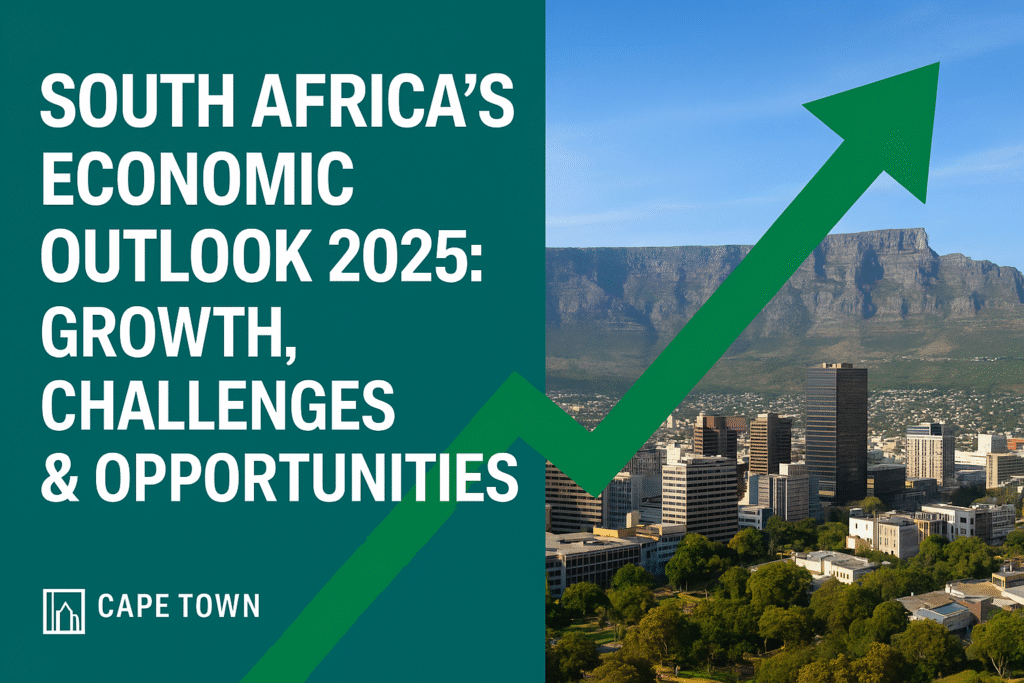1. The Road to Recovery and Renewal
South Africa’s economy is entering 2025 with cautious optimism, following years of turbulence caused by global inflation, power instability, and post-pandemic challenges. Despite these hurdles, new government policies and international collaborations are laying a strong foundation for recovery. Economic growth projections by financial experts suggest a potential GDP growth of 1.8% to 2.5% for the year, driven by structural reforms, renewable energy investments, and digital transformation.
Cape Town and Johannesburg remain central to this economic momentum. Cape Town, often called the “Silicon Valley of Africa,” continues to attract start-ups and investors due to its innovation-friendly ecosystem and expanding technology hubs. Meanwhile, Johannesburg remains the financial powerhouse, driving investment in manufacturing and banking sectors.

2. The Role of Policy and Governance
One of the key changes in 2025 has been the government’s focus on fiscal stability and investment security. South Africa’s Treasury has tightened spending and prioritized sectors that can deliver long-term economic impact—such as renewable energy, mining modernization, and digital infrastructure.
The National Development Plan (NDP) has been reinforced with clear targets on employment creation and education. Analysts note that consistent policy direction and anti-corruption drives have started to restore investor confidence. The collaboration between the public and private sectors is also strengthening, which is vital for ensuring job creation and economic inclusion.
3. Energy Reform: Powering a Sustainable Future
Energy remains the backbone of South Africa’s growth outlook for 2025. After years of persistent load shedding, the government and private entities are actively investing in renewable energy projects—including solar, wind, and hydroelectric power.
Cape Town has emerged as a leader in renewable adoption, with projects aiming to generate thousands of megawatts from clean energy sources. These initiatives not only promise energy stability but also open new employment opportunities for skilled workers in engineering, construction, and maintenance.
Additionally, the Just Energy Transition Partnership (JETP) has brought billions in international funding aimed at supporting South Africa’s green transition, signaling global confidence in the country’s sustainability agenda.
4. Trade, Investment, and the Global Market
South Africa’s global trade footprint continues to expand, especially within Africa through the African Continental Free Trade Area (AfCFTA). Intra-African trade is creating new business opportunities, particularly in manufacturing, logistics, and agriculture.
International investors are also regaining interest in the South African market, attracted by strong legal frameworks, stock market depth, and competitive labor costs. The Johannesburg Stock Exchange (JSE) remains one of the most advanced in the developing world, hosting a growing number of African tech and mining firms.
Foreign Direct Investment (FDI) in renewable energy, fintech, and agribusiness sectors is forecast to increase by 10–12% in 2025, highlighting renewed confidence in the country’s economic stability.
5. Technology and Innovation Driving Growth
Digital transformation is reshaping South Africa’s business landscape. With government incentives encouraging tech startups, cities like Cape Town and Durban are seeing a surge in digital entrepreneurs focusing on fintech, e-commerce, and health tech.
Major telecommunications providers are expanding 5G infrastructure, improving internet accessibility and business efficiency. This digital revolution is expected to contribute significantly to GDP growth, enabling South Africa to compete globally in the technology economy.
6. Social and Employment Challenges
While the outlook is positive, South Africa continues to face challenges in unemployment and inequality. Youth unemployment remains above 40%, which poses a major concern for sustainable growth. However, vocational training programs and digital education initiatives are gaining traction, preparing the next generation for future jobs in renewable energy, tech, and logistics.
The government’s social grants and infrastructure projects aim to uplift vulnerable communities, but the private sector’s role remains critical in driving real, inclusive progress.
7. The Outlook for 2025 and Beyond
As South Africa moves through 2025, the country’s resilience and adaptability will determine its long-term success. With an expanding renewable sector, improved policy governance, and rising digital entrepreneurship, the future looks brighter than in recent years.
Economic experts predict that continued structural reforms—especially in power generation and public sector management—could lift South Africa’s growth rate above 3% by 2026. Global investors are watching closely, and the time is ripe for both local and international businesses to tap into the nation’s emerging potential.
Read more in-depth African business and market stories on Cape Town Bulletin your trusted source for Africa’s latest financial, economic, and innovation news.



